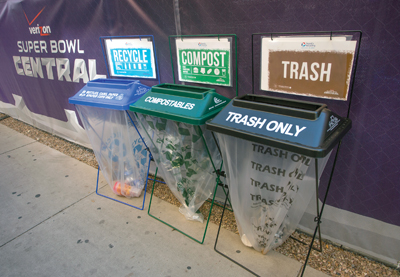There’s been a lot of activity around waste management at sports venues. MetLife Stadium, for example, has expanded recycling efforts into its parking lots, and the Seattle Mariners now recycle or compost more than 90 percent of all waste generated at Safeco Field.
But do fans really care that these venues are “green”? We were interested in the brand perception benefit (or harm) that these recycling and composting efforts can have, so we dug into the issue in our latest Eco Pulse study.
Our survey polled 2,015 representative Americans in spring of 2014, asking: “How would you react if you learned that all of the trash left behind after a game or concert you attended was sorted … with recyclables and compostables being diverted away from landfills?”
Nearly a third of Americans reported they would be more likely to attend a game or concert at a stadium if they learned that all of the trash left behind was recycled or composted. One in five also would buy more concessions.
Specifically:
■
46 percent said it would improve their opinion of the stadium or venue owners.
■ 32 percent said they would be more likely to attend another game or concert at the stadium or venue.
■ 22 percent said they would be more likely to buy concessions at the stadium or venue the next time.
■ 22 percent said it would improve their opinion of the team or band.
 |
Polling shows that American sports fans care about the environment, but want the convenience of clearly marked bins for recyclable and compostable materials.
Photo by: JIM POULIN / PHOENIX BUSINESS JOURNAL
|
And just as there is a carrot for stadiums to divert trash from landfills, there’s also a stick: Nearly one out of five Americans said they would be less likely to attend another concert or game if they learned all of the trash left behind went straight to a landfill. One quarter said they’d buy fewer concessions.
Specifically:
■ 42 percent said they would blame the stadium or venue owners, and it would tarnish their opinion of them.
■ 26 percent said they would be less likely to buy concessions at that stadium or venue.
■ 17 percent said they would be less likely to attend another game or concert at the stadium or venue.
So, overall, the venue gets the blame for poor waste management practices, but the potential for brand enhancement is significant for both venues and teams/entertainers if they do sort, recycle and compost.
Wendell Simonson, vice president of marketing for Eco-Products, said the survey is the first to measure Americans’ opinions on trash left behind at stadiums.
“We have a lot of anecdotal evidence of fans wanting stadiums to do more recycling and composting, but this is the first time we’ve had real data,” said Simonson, whose company makes compostable cups, plates and utensils.
With more than 200 million Americans going to sports events every year, and some 50 million attending concerts, this has major implications. At stake are tens of millions of dollars in ticket and concession sales and countless dollars worth of brand value, as well as tons of wasted resources.
Many venues have some sort of recycling program in place. In most cases, however, it’s limited to bottles and cans, so they’re really just scratching the surface of what’s possible from a waste diversion perspective.
It’s no wonder, then, that fans leave an estimated 16 million cubic feet of trash behind every year. That’s enough to fill Yankee Stadium and leave another 2 million cubic feet of garbage on the streets outside.
Clearly, venues need to be doing more … with one caveat: They need to make it easy for fans.
Our polling consistently shows that Americans want companies to “do it for them.” Yes, convenience trumps the environment. (That’s why consumers like to take “easy” green actions like installing an energy efficiency light bulb. It’s much easier than always unplugging electronics when they’re not in use.)
And since fans care about the environment, but don’t want to sacrifice their personal convenience, they aim their guilt-turned-anger to the facilities. As in, “Why on earth don’t they have composting bins? I really don’t want to toss the rest of these nachos into the landfill!”
Our surveys, in fact, have found Americans feel a lot of “green guilt.” We found that 56 percent of Americans have waste-related concerns, nearly a quarter feel guilty about not recycling, and 13 percent feel guilty about using paper plates and cups. Walking up the steps of a stadium littered with trash going to a landfill just makes it worse.
That’s why stadiums would be wise not only to use compostable and recyclable food packaging, but also to communicate why they’re doing it. They need to package their message into simple sound bites for fans with the theme: “We’re fighting waste.” And then they need to communicate it in a variety of ways; one quick mention on the Jumbotron is not enough.
Our research shows using compostable and recycled food packaging is a win-win … not just because a venue or team is helping the planet, but also because they are making their patrons feel better about coming to events and buying concessions. Fans don’t have to feel guilty about all that trash being generated. Venues/teams are taking care of their waste for them, and they get peace of mind from knowing the right thing is being done all the way around.
That’s something everyone can cheer for.
Suzanne Shelton (sshelton@sheltongrp.com) is founder and CEO of Shelton Group, a marketing communications firm focused in the energy and environment space.





